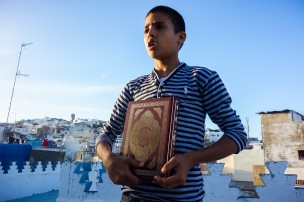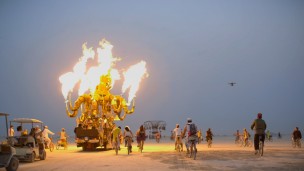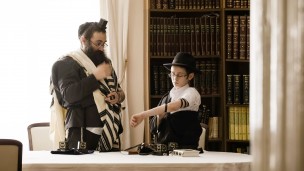The Argus sits down with David Shadrack Smith '92 to discuss "Belief," his new program for the Oprah Winfrey Network.
“Belief,” a new program on the OWN network, premieres on Oct. 18 and will air for seven consecutive nights. It is a highly ambitious project three-years in the making. A few weeks ago, The Argus sat down with David Shadrack Smith ’92, director of the project and also founder of Part 2 Pictures, which produced the show. Smith acknowledged that “Belief” was inspired by the scale of “Planet Earth.” However, where “Earth” tackled the subject of animal life across the globe, “Belief”’s subject is more abstract. It attempts to cover human spirituality and faith from a plethora of perspectives across the planet.
The Argus:With a project on this scale, how did you decide which stories to tell?
David Shadrack Smith: From very early on, we knew it was all going to be about the people and their stories. And from there we created other criteria. You know, we wanted, certainly, to have a grand scale, so we knew we wanted to travel the globe so you could see “Belief” in this big…global tapestry. So then, certain geographic criteria came in. And then there were some events that were just so big and incredible to imagine filming at so we set out very early to make sure we were there. And then it became a matter of finding people who were going there who had stories that they could share with us. An example of that [is] Kumbh Mela, which is the largest gathering of humankind on Earth; [it] happens once every 12 years, [and it] happened inside our window, 70 million people in India gathering to worship on the banks of the Ganges.Mecca was another obvious; we knew we had to go to Mecca.
And then when we were thinking broadly about the idea of belief, there were other events that came to the forefront. Like Burning Man, for instance. And there were some never really filmed before Native American rituals that we wanted to feature. Sometimes we started with the event or context and then tried to find the people within them. And other times we actually started with the people. We knew we wanted to tell the story of a bar mitzvah, for instance. And so we looked the whole world over to find the best bar mitzvah boy we could. And we wanted to tell a story of how fate shaped love, and we found a couple in America, Ian and Melissa, who were faced with a very, very difficult choice in their relationship and were guided by their belief, so they led the story there. So there’s a real mix, but at every point, you know, that was our lion’s share of our working: “What do you think about this story? What about these people? How would you go about this?” And it was by far and away the most important part of the whole series.
A: It sounds like Oprah was very hands-on with the project.
DSS: Yes. Yes. She said to us, at any rate, that this was one of the most important undertakings of her creative career. She really wanted to make sure that the world got to see this, and of course that’s what we hoped as well. Though, I shouldn’t be quoting her. Essentially, yeah, she put a lot of energy and attention and care and time into putting time with us on this project.
A: So, we’re less than a month away from the premiere. How are you preparing?
DSS: My life has changed dramatically [laughs]. I have about a third of it back. It’s very exciting. We just finished putting what I would say are the very, very final touches, so you know, painting the trim around the windows, installing the doorknobs on this house we’ve been building for three years. We just finished doing that last week. So it’s ready to go. We’ve gone through this as carefully, as detailed as you can possibly ever go through anything that I’ve ever worked on. And now for the audiences to show up, and of course, that’s what we’re hoping and definitely anxious about. Making sure as many people know about the series and will want to watch and will want to be engaged with thinking about their own beliefs and the beliefs of others and how to have that conversation. So, we’re just hoping that lots of people watch and come away inspired to ask deeper questions about who they are and what they believe and what their sense of purpose is in life, you know, those universal questions that are at the heart of this series.
A: Let’s shift gears to your time at Wesleyan.
DSS: Sure. There were actually a number of Wesleyan graduates who worked on this series. Partly by chance, but not entirely, perhaps. Not in some nepotistic way but in the way that, you know, we were all forged in the same way to approach big and interesting ideas, and I think Wesleyan really promoted that. I was an East Asian Studies major, which was kind of random, mentored by [Freeman Professor of History and East Asian Studies] Vera Schwarcz, who probably has retired now, but she was the great figure of East Asian Studies for many years at Wesleyan. Editor’s note: Schwarcz still teaches at Wesleyan. But while I was there, I’d always been interested in visual culture and photography and a Visiting Professor named Jonathan Mednick spent a couple of years in the Film Department there. And I was curious enough to want to drop in and take some documentary filmmaking classes. Actual production classes. And it really opened up my eyes and my sense of what I could achieve with this medium and my other interests and how to tell stories. And he was only there a couple of years but he really impacted a lot of us. In fact, Darcy Dennett [’92], who also worked on “Belief,” was in my class. And there are three or four other people who are, you know, prominent in the field of television who were all in that class together. So we were all changed by it and I think it was the roots of all that I know about making documentaries and how to approach this sort of structural framework of authenticity and storytelling, that all started at Wesleyan…. I think [I] was really powerfully informed, not only by that class but also [by] subsequent classes I took in the Film Department, [including] Anthropology of Film, which you can see a lot of in this series, how we approached things. So I guess I was sort of a film minor, you know? I unofficially declared myself a film minor.
A: Do you have any advice for the incoming class?
DSS: Let me think about that one. Well, here is what I took away from my years at Wesleyan and what I found my interactions with Wesleyan graduates later to be: It’s the place where I’ve seen the most interesting people to come out of [laughs]. In other words, wherever I’ve been in the world–because I went to China for many years and came back to television and film–wherever I went, there was always someone from Wesleyan doing something unusual, certainly not in a predictable, easily categorized way. And I think my advice would be to be as interesting as you can imagine.
There isn’t a single course to chart in life, and [we should] let that exploration be the journey itself. And with “Belief” coming out, I guess I should say, know what you believe but be wide open to how it will all unfold.
A: Anything else you’d like to add?
DSS: I would certainly say the experience of making the “Belief” series was unique and ultimately, we all thought a lot about where we came from and what we can do with our lives. And I do feel, especially with the group that came from Wesleyan and we all had that shared experience, I was surprised to find how many of my ideas and thoughts and very foundational stuff was forged in those college years. And I don’t think I could’ve predicted that from sitting in the middle of those college years. Though, whether or not you come out with this incredibly clear sense of what you want to do with your career, it’s the way you think and the way you are going to approach whatever you do in the future that’s being formed right now. And I think it was very interesting to check back in with that and realize that those seeds that you plant do kind of blossom into their own specific shape in your approach to life, so enjoy it.
This interview has been edited for length and clarity.




Comments are closed